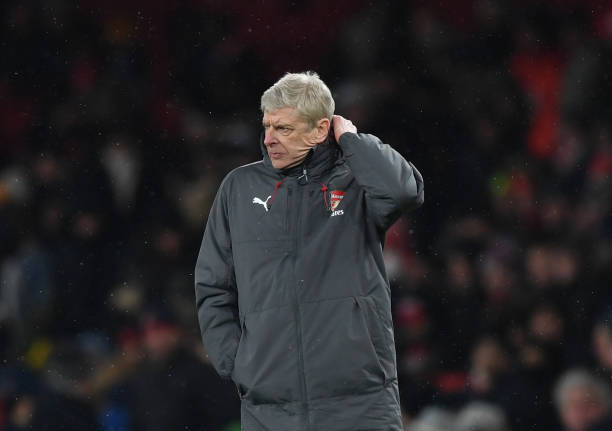In recent seasons, Arsenal have started to settle into a pattern of making a late flourish when all seems lost, but then performing even more poorly in the next campaign.
The final stretch of each season seems to lull fans into a false sense of security, making them think everything isn’t as bad as it appeared. It never lasts though. Let’s take a look at the last four seasons to illustrate the point.
2014/15
For much of the 2014/15 season, Arsenal struggled to impose themselves anywhere near the top of the table. Excluding the first two weeks of the season, the team could never get higher than fourth, and a defeat to Spurs in February left them in sixth place.
After an embarrassing 3-1 home loss to Monaco later in the month, things really looked bleak.
Then came the trademark late run. A win over Monaco restored some pride, even if 2-0 wasn’t enough to stay in the competition.
Eight straight wins in the league lifted the team to second place. In the FA Cup, Arsenal knocked out Manchester United and suddenly had a free path to the trophy.
The league form dropped off a bit once Arsenal secured top four and the focus shifted to Wembley. The team smashed Villa 4-0, lifted the cup, and most of the earlier troubles were forgotten.
2015/16
The Premier League was as open as it had ever been the next season, yet Arsenal performed even more poorly.
By March they were out of the running in every competition, with Watford knocking them out of the FA Cup, Sheffield Wednesday embarrassing them in the League Cup and Bayern Munich and Barcelona combining to crush the team’s Champions League dreams.
Meanwhile, consecutive defeats to Manchester United and Swansea ended their title hopes.
After that, Wenger’s side went unbeaten until the end of the league season. They went to White Hart Lane and the Etihad and got results, and edged in ahead of Spurs for second place on the final day.
Despite the higher league finish, Arsenal’s points tally decreased from 75 to 71, and they went trophyless. It was a worse season than 2014/15, but again the final flourish left fans vaguely optimistic.
2016/17
This season didn’t start too badly, but from December to April Arsenal’s league form fell to pieces. It started with two defeats in a week to Everton and Manchester City, and ended with chants of “you’re not fit to wear the shirt” at Selhurst Park.
By that stage Wenger’s side were sixth, and still reeling from a 10-2 aggregate defeat to Bayern Munich in the Champions League.
The manager’s job looked almost impossible to save. His contract was expiring at the end of the season, and Arsenal would have to beat two of Manchester City, Chelsea and Spurs to win the only trophy still available. Plus their top four chances were disappearing fast.
They then won seven of the final eight league games, including beating Jose Mourinho’s Manchester United, grabbing a rare win away to Stoke and overcoming the odds to beat Everton with 10 men on the final day. It wasn’t quite enough, and Liverpool took the final Champions League spot by a point.
The FA Cup dream stayed alive though, with Arsenal finishing off City in injury time to set up a date with Premier League Champions Chelsea in May. The team silenced the doubters with a 2-1 victory in the final and set a new record for FA Cup wins.
It was a pretty terrible season, but still ended on a high point, and Wenger got a contract extension not long afterwards.
2017/18
That brings us to this season. At this stage in early March, it’s already impossible for Arsenal to reach their points tally from 2016/17. The team have a league win percentage of 45%, and an overall percentage of 50%. They’ve lost more in all competitions than the whole of the previous campaign as well.
The last couple of months have been a complete nightmare in the league, with five defeats in just seven matches. Plus there were the cup eliminations to Nottingham Forest and Manchester City (although the latter was in the final against the best team in the country).
Amazingly, there’s still potential for Wenger’s side to come good right at the end. Arsenal are still fighting on one front, the Europa League, and things are going pretty well. They had a solid group stage and three good halves in two matches against Östersund. Now they’re 2-0 up against one of the competition favourites after victory in Milan.
With any luck, this could be the late flourish we’re now coming to expect from the team. Arsenal could well go on a European run, and lifting the trophy would mean Champions League qualification for next season.
If we can learn anything from the past few years though, it’s that this wouldn’t necessarily mean an improvement next season. In fact it could just as easily be followed by something even worse, as difficult as that is to imagine.
Arsenal, Wenger and Stan Kroenke need to think hard about how they’re going to avoid that happening. The damage another year of regression could do isn’t something we should dismiss lightly. It’s time to act.
